
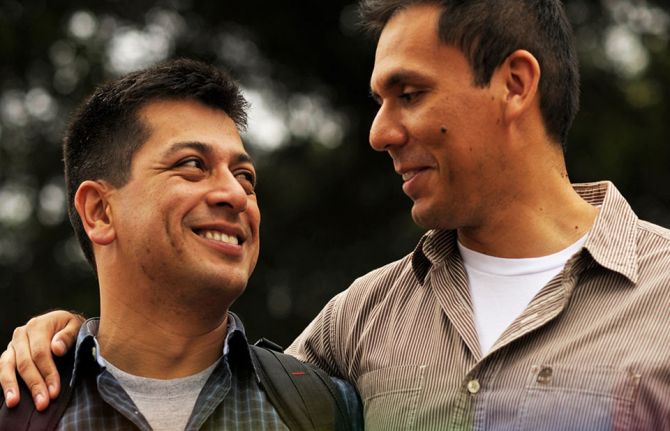
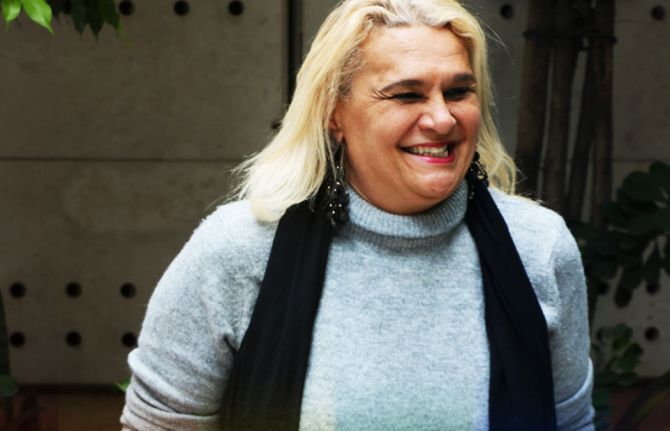
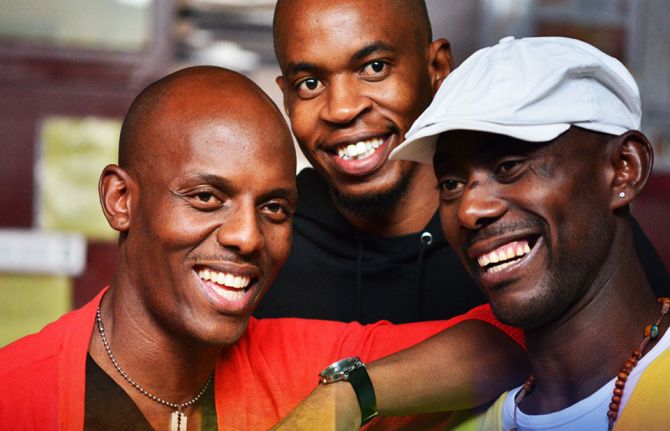

Press Release
UNAIDS celebrates Pride Month and calls for decriminalization of same-sex relationships
31 May 2023 31 May 2023GENEVA, 1 June 2023—As the world comes together to celebrate Pride Month, UNAIDS stands in solidarity with lesbian, gay, bisexual, transgender, queer and intersex (LGBTQI) communities around the globe. Pride Month provides an opportunity to celebrate the resilience, diversity, and achievements of LGBTQI individuals, while also reflecting on the challenges they continue to face. This momentous occasion serves as a reminder of our collective commitment to human rights, equality, and the urgent need to decriminalize same-sex relationships.
Cleiton Euzebio, Senior Advisor for Communities and Key Populations, UNAIDS said, “As a gay man, and as an activist for social justice for all, I am so proud to work for the UN’s Joint Programme to end AIDS. The UN is standing with communities, supporting them in leading the HIV response, confronting stigma, and building societies where every person is valued. This month and every month, may everyone feel pride in who they are.”
Thanks in large part to efforts led by key populations, the world has seen substantial progress in the HIV response. The end of AIDS is possible. However, inequalities stand in the way. Discrimination, violence, and stigma against LGBTQI people persist in many parts of the world, limiting access to essential services, including HIV prevention, treatment, care, and support.
Criminalization of same-sex relationships remains a significant barrier to achieving social justice and equality for LGBTQI individuals, and to ensuring health for all. Laws that criminalize consensual same-sex activity perpetuate stigma, contribute to violence and discrimination, and obstruct access to vital healthcare services. UNAIDS calls on all governments to urgently repeal discriminatory laws and policies, and to work towards creating an enabling legal and social environment that respects and protects the rights of LGBTQI people.
The decriminalization of same-sex relationships is a crucial step in our collective efforts to end the AIDS pandemic. When marginalized communities are criminalized or stigmatized, their vulnerability to HIV infection increases, and their access to HIV prevention, treatment, care, and support services is obstructed.
Significant gains that have been won in advancing LGBTQI rights in many parts of the world, including the decriminalization of same-sex relationships in several countries—from Angola to Singapore to Barbados. However other countries are imposing harsher criminal laws on same sex relationships. Decriminalizing homosexuality is essential to ensuring the end of AIDS.
UNAIDS will be taking part in the Geneva Pride march on 10th June. Pride Month is a vital reminder of the need for governments, civil society organizations, and individuals to join together for the protection and promotion of human rights for all, irrespective of sexual orientation, gender identity, or expression. Together, we can build a world that upholds equality, justice, and dignity for everyone.
UNAIDS
The Joint United Nations Programme on HIV/AIDS (UNAIDS) leads and inspires the world to achieve its shared vision of zero new HIV infections, zero discrimination and zero AIDS-related deaths. UNAIDS unites the efforts of 11 UN organizations—UNHCR, UNICEF, WFP, UNDP, UNFPA, UNODC, UN Women, ILO, UNESCO, WHO and the World Bank—and works closely with global and national partners towards ending the AIDS epidemic by 2030 as part of the Sustainable Development Goals. Learn more at unaids.org and connect with us on Facebook, Twitter, Instagram and YouTube.
Resources
Our work

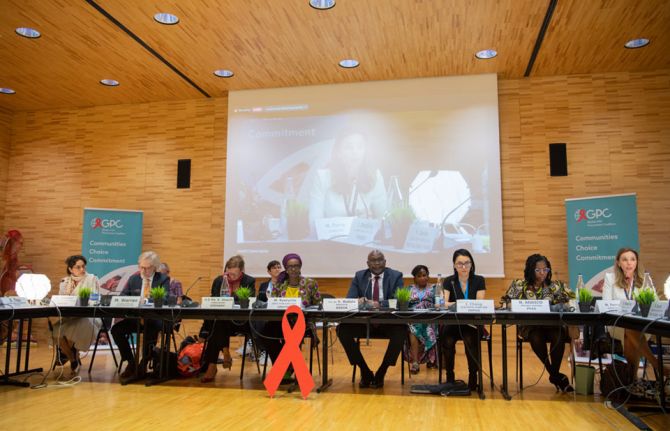
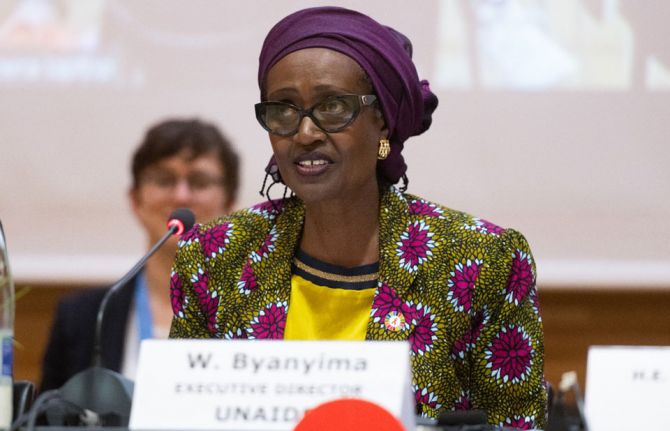
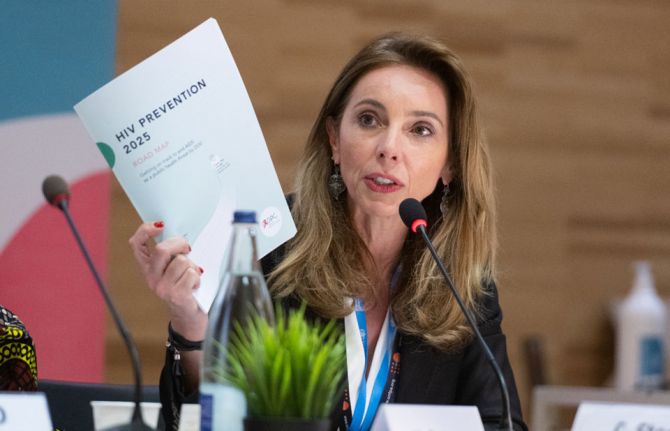
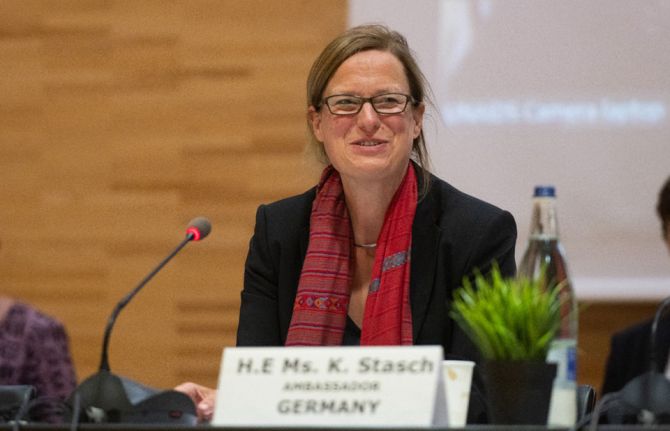
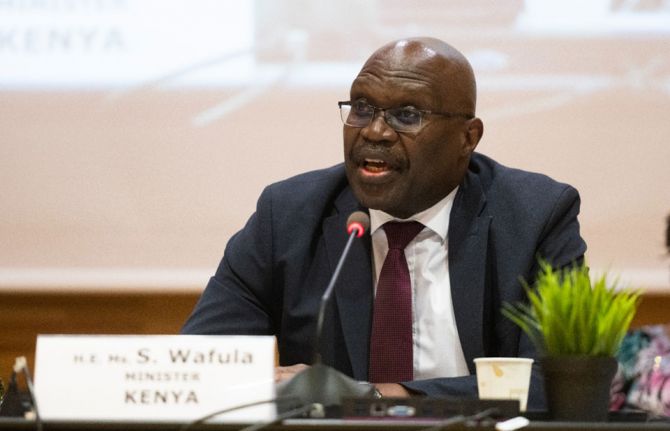
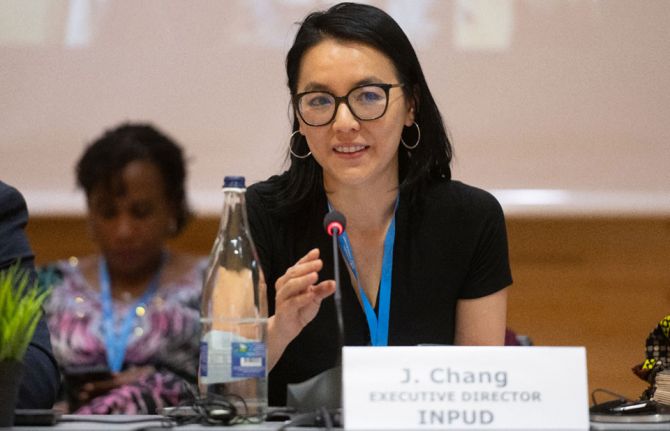

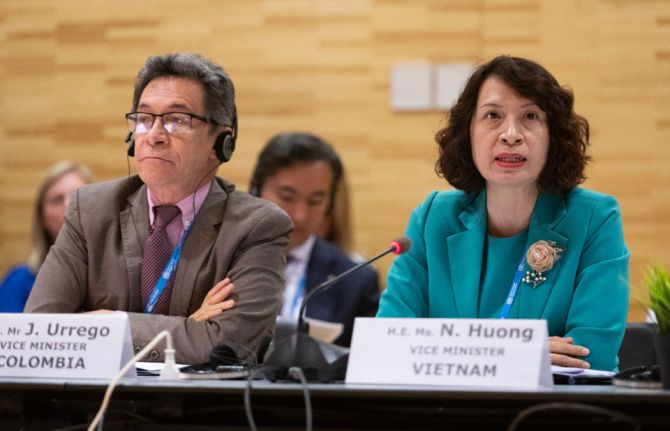
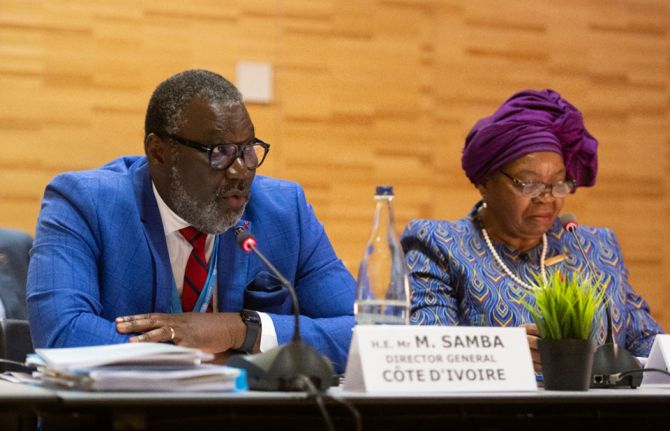


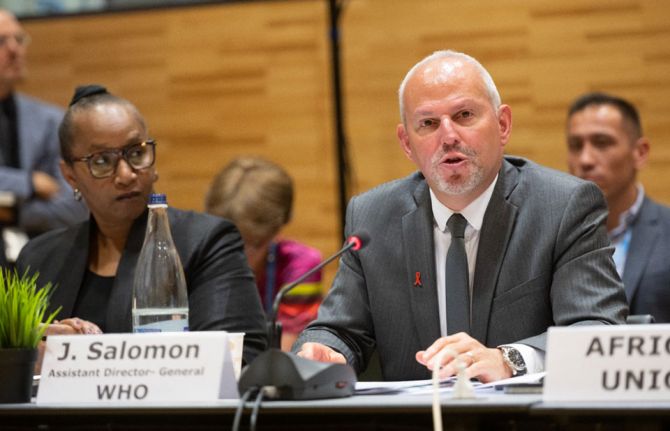
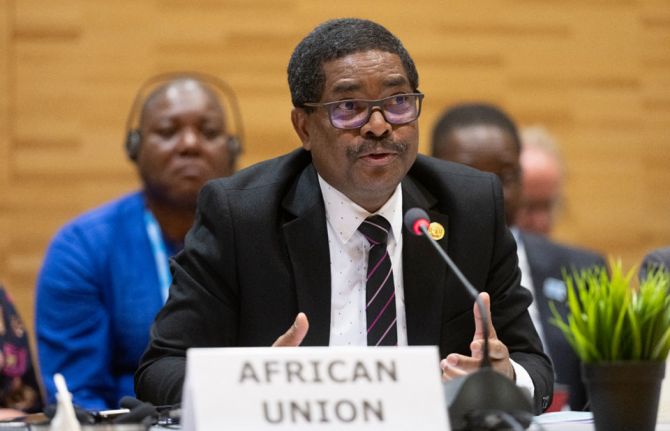
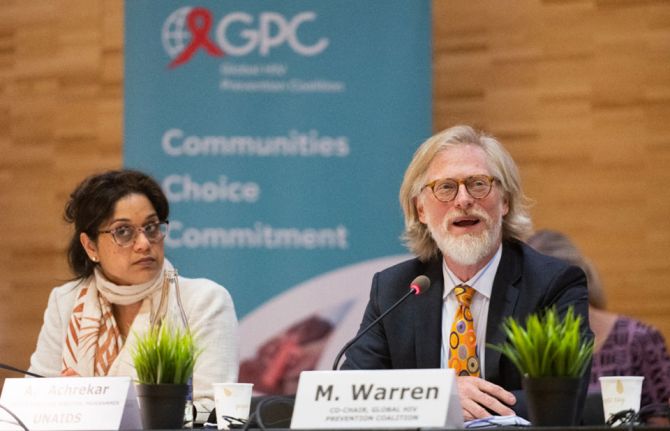
Press Release
UNAIDS alerts countries to an unprecedented opportunity to stop new HIV infections, end AIDS and prepare for future pandemics
24 May 2023 24 May 2023GENEVA, 24 May 2023—UNAIDS urges countries to take full advantage of new opportunities to step up funding, expand new and proven HIV prevention technologies and remove barriers to HIV services. Taking action today will boost progress to end AIDS and respond to current pandemics and pandemics of the future.
On the side-lines of the 76th World Health Assembly, Ministers of Health joined global health leaders and experts at a high-level event of the Global HIV Prevention Coalition. Hosted by UNAIDS, the event was called to increase political commitment, address policies and laws that drive inequalities and pandemics, secure additional funding and ensure effective HIV programming is implemented at scale.
“Never has the opportunity to prevent HIV been greater,” said Winnie Byanyima, Executive Director of UNAIDS. “We have tools and technologies—none of which are being made available widely enough. Doing justice to this unique opportunity requires bold leadership and renewed investment into HIV prevention to provide effective prevention choices to all who need them.”
UNAIDS In Danger report showed that in 2021 there were 1.5 million new HIV infections globally, more than three times the target of 500 000 at the end of 2021. The 2025 target is to reduce new HIV infections to less than 370 000. In order to reach that target, countries will need to attain an 82.5% reduction from 2010 as outlined in the 2025 HIV Prevention Roadmap - a 10 step how-to- guide to reach the 2025 targets.
“This is the best chance we’ve ever had, in probably the entire history of the AIDS pandemic, to reimagine HIV prevention and to do it with equity and with impact,” said Mitchell Warren, Global HIV Prevention Coalition, Co-chair.
Of the 28 priority countries identified by the Global HIV Prevention Coalition, new analysis of data from UNAIDS, shows that five countries (Cote d’Ivoire, Zimbabwe, Malawi, Lesotho and the Islamic Republic of Iran) reduced new HIV infections by more than 61% from 2010 to 2021—the level of progress needed. A further twelve countries recorded a reduction of more than 40%.
Data also show however, that new HIV infections are rising in 38 countries, some with sizeable HIV epidemics. This worrying trend calls for accelerating prevention and expanding the Coalition to these countries.
According to the 2022 UNAIDS Global HIV Prevention Coalition country scorecards, dedicated HIV prevention programmes for adolescent girls and young women only exist in 41% of districts with moderate to high HIV incidence in sub-Saharan Africa.
The scorecards also show that in Coalition focus countries with available data, 63% of sex workers, 49% of gay men and other men who have sex with men and 36% of people who inject drugs were reached with HIV prevention services in 2021. High stigma in mainstream health service delivery, criminalization of key populations, harmful law enforcement practices, gender and structural barriers remain major obstacles to access HIV prevention services for key populations.
“Evidence and rights-based HIV programming, that meaningfully involves key populations, is simply not being sufficiently invested in and brought to scale. For example, when it comes to people who use drugs, only 2% of us live in countries with high coverage of basic harm reduction services,” said Judy Chang, International Network of People who Use Drugs. “If we fail to make investments based on public health rationale, but do so based on so-called moral agendas, we will fail global health. We need countries to invest fully in HIV prevention and community systems.”
Access to condoms, PrEP (medicine to prevent HIV) and voluntary medical male circumcision remains highly uneven. Only Uganda and Zimbabwe met more than 80% of the condom distribution need. Data also suggests declining condom use in several countries after 2015 showing an urgent need to halt and reverse declining trends in condom use. Although uptake of PrEP increased rapidly in the 28 focus countries, absolute numbers remain very low—1.5 million users at the end of 2021 against the global target of more than 10 million.
The number of men undergoing voluntary medical male circumcision for HIV prevention (which studies show prevents HIV by up to 60% for men) was consistently more than 4 million per year from 2017-19, declined by 40% in 2020 and in 2021 remained at 2.8 million with only Ethiopia, Tanzania and Zambia meeting annual targets. These programmes require renewed focus in countries to meet 90% targets set out in the Global AIDS Strategy 2021-2026.
This data analysis highlights both encouraging successes and persistent gaps in national HIV prevention programmes. The reality of success in several countries paired with new available technologies creates a unique opportunity for concerted action to stop new HIV infections, end AIDS and strengthen pandemic preparedness and response.
UNAIDS
The Joint United Nations Programme on HIV/AIDS (UNAIDS) leads and inspires the world to achieve its shared vision of zero new HIV infections, zero discrimination and zero AIDS-related deaths. UNAIDS unites the efforts of 11 UN organizations—UNHCR, UNICEF, WFP, UNDP, UNFPA, UNODC, UN Women, ILO, UNESCO, WHO and the World Bank—and works closely with global and national partners towards ending the AIDS epidemic by 2030 as part of the Sustainable Development Goals. Learn more at unaids.org and connect with us on Facebook, Twitter, Instagram and YouTube.



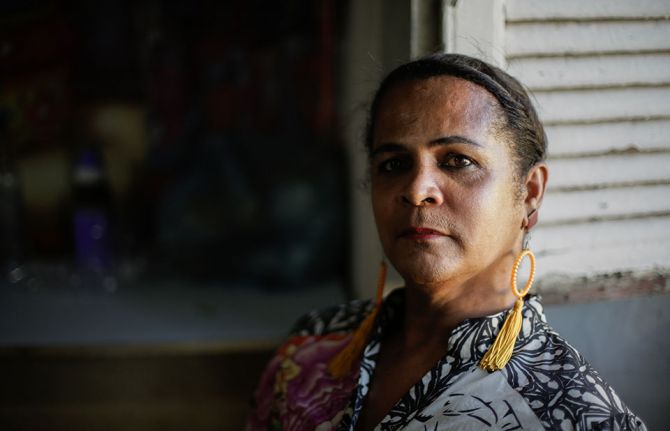
Press Release
UNAIDS urges all countries to decriminalise homosexuality as a vital step in ensuring health for all
17 May 2023 17 May 2023Released ahead of the International Day against Homophobia, Transphobia and Biphobia – 17 May 2023
GENEVA, 15 May 2023—Around the world, 67 countries still criminalise same sex relations, with 10 imposing the death penalty. 20 countries criminalise gender diversity. Such laws hurt the public health of everyone, costing lives. Public health and human rights go hand in hand.
“The importance of decriminalising homosexuality and gender diversity cannot be underestimated,” said Christine Stegling, Deputy Executive Director, Policy, Advocacy and Knowledge, UNAIDS. “Decriminalising will save lives and is a crucial step towards equality, dignity, and health for all.”
Across all cultures, sexual orientation, gender identity, and expression are diverse. LGBTQI+ people are part of every society in every country since time immemorial, yet LGBTQI+ people continue to be marginalised and excluded—be it legally, culturally, socially or a combination of all.
Criminalisation, along with pervasive discrimination and violence, obstructs LGBTQI+ people from accessing life-saving services. In a growing number of cases, health service providers are also experiencing being harassed by vigilantes or police for providing life-saving services to LGBTQI+ people.
UNAIDS reports that in countries where same sex relations are criminalised, HIV prevalence is five times higher among gay men and men who have sex with men than in countries where same sex relations are not criminalised. Where there have been recent prosecutions, this increases to 12 times higher.
Recognizing that criminal laws have a detrimental impact on the HIV response, United Nations member states at the UN General Assembly committed to ambitious targets in the 2021 Political Declaration on HIV to remove criminal laws that are undermining the HIV response and leaving key populations behind. Recognizing decriminalisation as a critical element in the HIV response, countries made a commitment that by 2025, less than 10% of countries would have punitive legal and policy environments that affect the HIV response.
There has been a positive wave of progress. In the past year Antigua & Barbuda, St Kitts & Nevis, Singapore, Barbados and the Cook Islands have repealed old colonial laws which had criminalised same-sex relations. Kuwait’s court overturned a law that had criminalised “imitating the opposite sex”.
Brazil is amongst the countries driving forward progress in advancing the human rights of LGBTQI+ people. The Minister of Health and the Minister of Human Rights will announce that the country will be joining the Global Partnership for Action to Eliminate All Forms of HIV-related Stigma and Discrimination during an event on 17 May. The event will focus on access to care and justice for trans and gender-diverse communities.
However, running counter to the wave of progress is a renewed, well-funded, well-organised international drive to sow prejudice and push discriminatory and harmful new anti-homosexuality legislation and anti-trans legislation.
If enacted into law, this legislation will have extremely damaging consequences for public health, obstructing LGBTQI + people from accessing health services, and obstructing health workers from providing, life-saving services including services to prevent and treat HIV. It is vital for public health that this harmful push be stopped.
On International Day against Homophobia, Transphobia and Biphobia, UNAIDS is calling on all countries to remove punitive laws and tackle prejudices against lesbian, gay, bisexual, transgender and intersex people. A more just, equitable and kind world is a healthier one, for everyone.
UNAIDS
The Joint United Nations Programme on HIV/AIDS (UNAIDS) leads and inspires the world to achieve its shared vision of zero new HIV infections, zero discrimination and zero AIDS-related deaths. UNAIDS unites the efforts of 11 UN organizations—UNHCR, UNICEF, WFP, UNDP, UNFPA, UNODC, UN Women, ILO, UNESCO, WHO and the World Bank—and works closely with global and national partners towards ending the AIDS epidemic by 2030 as part of the Sustainable Development Goals. Learn more at unaids.org and connect with us on Facebook, Twitter, Instagram and YouTube.
United Nations Secretary-General’s message for IDAHOBIT
Our work
#IDAHOBIT resources




Press Release
UNAIDS calls for access to HIV prevention, treatment and care in prisons, including access to life saving harm reduction services
07 May 2023 07 May 2023Harm reduction policies and practices help people who are using drugs to stay alive and protect them from HIV and Hepatitis C
Released ahead of International Harm Reduction Day - 7 May 2023
GENEVA, 5 May 2023—Many prison systems are struggling to cope, with overcrowding, inadequate resources, limited access to healthcare and other support services, violence and drug use. In 2021, the estimated numbers of people in prisons increased by 24% since the previous year to an estimated 10.8 million people, increasing the strain on already overstretched prison systems.
Drug use is prevalent in prisons. UNAIDS Cosponsor, the United Nations Office on Drugs and Crime (UNODC), estimates that in some countries up to 50% of people in prisons use or inject drugs. Unsafe drug injecting practices are a major risk factor for the transmission of HIV and hepatitis C due to limited access to harm reduction services, including condoms, clean needles and syringes, and a lack of comprehensive drug treatment programs, particularly opioid agonist therapy.
People in prison are 7.2 times more likely to be living with HIV than adults in the general population. UNAIDS reports that HIV prevalence among people in prisons increased by 13% since 2017, reaching 4.3% in 2021. Although data are limited, it is thought that around one in four of the total prison population has hepatitis C.
“Access to healthcare, including harm reduction services, is a fundamental human right, and no one should be denied that right because they are incarcerated,” said Eamonn Murphy, UNAIDS Regional Director for Asia Pacific and Eastern Europe and Central Asia. “Prisons are too often ignored in countries' efforts to respond to HIV. A multisectoral, multifaceted approach is urgently needed to save lives, which includes access to clean needles and syringes, effective treatment for dependence on opioid drugs and reducing stigma and discrimination.”
Both drug use and HIV infection are more prevalent among women in prison than among imprisoned men. In particular, women who use drugs and sex workers are overrepresented in prisons. Highlighting the urgent need to scale up the implementation of community-led harm reduction services for women who use drugs and women in prison.
Ms Ghada Waly, Executive Director of UNODC, said, “It is time to put compassion at the heart of our responses. To take a more serious look at de-penalization and alternatives to incarceration for minor drug offenses, focusing instead on treating and rehabilitating. To use a gender-sensitive lens when looking at women and girls who use drugs, and to ensure that they have equal access to treatment. To reach out to young people, who are using drugs more than ever before, understand their vulnerabilities to substance abuse, and help them be part of the solution. To stand with marginalized and vulnerable people, including people in prisons who are underserved by treatment programmes, and people who inject drugs, who are far more likely to be living with HIV, yet far less likely to access life-saving services”.
Among the countries reporting on prisons to UNAIDS in 2019, just 6 of 104 countries had needle and syringe programmes in at least one prison; only 20 of 102 countries had opioid substitution therapy programmes in at least one prison, 37 of 99 countries had condoms and lubricants in some prisons.
UNAIDS, UNODC, and WHO have long supported expanding harm reduction services to all prisons. However, according to Harm Reduction International, only 59 countries globally provide opioid agonist therapy in prisons.
Some countries have made huge progress in recent years. Despite the challenges faced by the influx of refugees and the repercussions of the war in Ukraine, Moldova, (which has an HIV prevalence of 3.2% in its prisons, compared to 0.4% among the general population) has committed significantly more resources into its prison systems.
In the early 2000’s few of its prisons provided harm reduction services. Today all of the country’s 17 penitentiaries provide harm reduction services including, methadone (an opioid agonist therapy), access to psychiatrists, doctors and treatment programmes, needle and syringe exchange and HIV prevention, testing, treatment and care.
Svetlana Plamadeala, UNAIDS Country Director in Moldova said, “It’s about putting people front and center, treating them as equals and taking on a solid, public health approach, grounded in human rights and evidence.”
UNAIDS, UNODC, UNFPA, WHO, ILO and UNDP recommend 15 comprehensive and essential interventions to save lives and ensure effective HIV programming in prisons. These include HIV prevention, testing and treatment, condoms, lubricant, opioid agonist therapy and post-exposure prophylaxis. However, this is only part of the solution. UNAIDS also recommends that countries amend their laws to decriminalize the possession of drugs for personal use.
UNAIDS has set ambitious targets for 2025 which include: 95% of people in prisons and other closed settings who know their HIV status, 95% who know their status are on treatment; and 95% on treatment are virally suppressed; 90% of prisoners used condoms at last sexual activity with a non-regular partner; 90% of prisoners who inject drugs used sterile needles and syringes at last injection; and that 100% of prisoners have regular access to appropriate health system or community-led services.
UNAIDS advocates that communities take an active role in planning, providing and monitoring HIV services. However, this is not always facilitated in prison settings. Without community engagement it will be impossible to reach the global AIDS targets.
For more information on Moldova’s work on HIV in prisons please read Moldova expands harm reduction services to all prisons and watch https://youtu.be/JQYtnsiJKs0
Fact sheet: UNAIDS Human rights fact sheet on HIV in prisons
UNAIDS
The Joint United Nations Programme on HIV/AIDS (UNAIDS) leads and inspires the world to achieve its shared vision of zero new HIV infections, zero discrimination and zero AIDS-related deaths. UNAIDS unites the efforts of 11 UN organizations—UNHCR, UNICEF, WFP, UNDP, UNFPA, UNODC, UN Women, ILO, UNESCO, WHO and the World Bank—and works closely with global and national partners towards ending the AIDS epidemic by 2030 as part of the Sustainable Development Goals. Learn more at unaids.org and connect with us on Facebook, Twitter, Instagram and YouTube.
Contact
UNAIDS GenevaCharlotte Sector
tel. +41 79 500 8617
sectorc@unaids.org
UNAIDS Eastern Europe and Central Asia
Snizhana Kolomiiets
kolomiietss@unaids.org
UNAIDS Geneva
Sophie Barton Knott
tel. +41 79 514 6896
bartonknotts@unaids.org
Watch: Moldova expands Harm Reduction services to all prisons

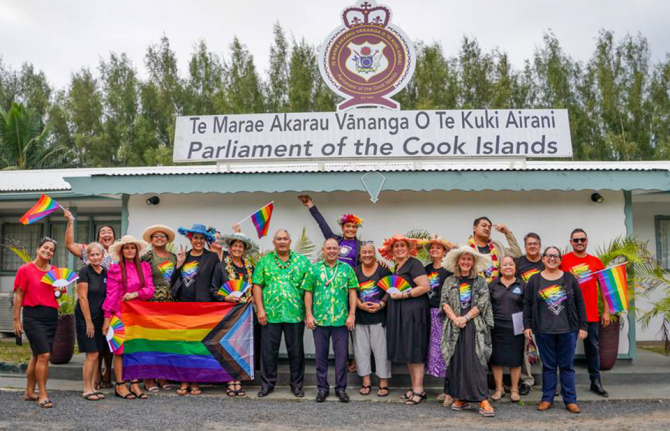
Press Release
UNAIDS welcomes the decriminalisation of same-sex relations by the Cook Islands parliament
15 April 2023 15 April 2023BANGKOK, 15 April 2023—UNAIDS applauds today’s decision by Cook Islands lawmakers to remove laws prohibiting consensual sexual acts between men from the Crimes Act. By decriminalising sex between same-sex partners, the Pacific nation joins a global movement toward affirming the human rights to non-discrimination and privacy.
“Cook Islands’ latest move is part of a wave of global progress around removing laws that harm. It will inspire countries across the Pacific, Asia and the world to follow suit. Decriminalise, save lives," said UNAIDS Asia Pacific Regional Director, Eamonn Murphy.
Criminalisation of same-sex relations undermines the human rights of lesbian, gay, bisexual and transgender (LGBT) people. Punitive laws reinforce stigma and discrimination against LGBT people, undermining their access to the rights, remedies and opportunities available to other people. Such laws also obstruct access to vital services, including sexual and reproductive healthcare.
"This decision by Cook Islands will save lives,” said Mr Murphy. “The abolition of punitive and discriminatory colonial laws across the world is essential for public health, including for ensuring the end of AIDS.”
Bi-partisan support for the Crimes (Sexual Offences) Amendment Bill demonstrates that policy-makers, civil society and communities can dialogue to develop laws that create more just and equitable societies.
UNAIDS
The Joint United Nations Programme on HIV/AIDS (UNAIDS) leads and inspires the world to achieve its shared vision of zero new HIV infections, zero discrimination and zero AIDS-related deaths. UNAIDS unites the efforts of 11 UN organizations—UNHCR, UNICEF, WFP, UNDP, UNFPA, UNODC, UN Women, ILO, UNESCO, WHO and the World Bank—and works closely with global and national partners towards ending the AIDS epidemic by 2030 as part of the Sustainable Development Goals. Learn more at unaids.org and connect with us on Facebook, Twitter, Instagram and YouTube.
Our work

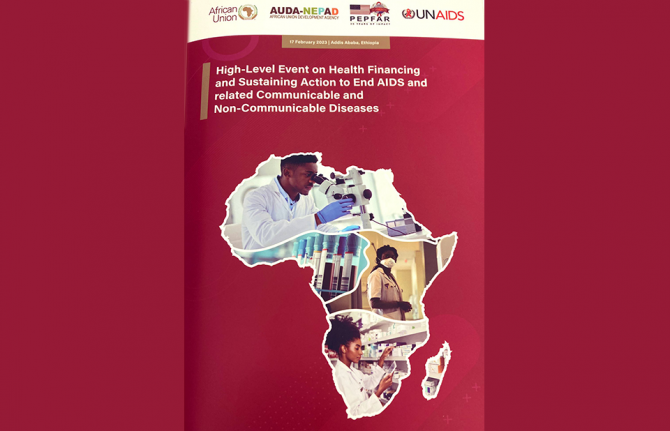
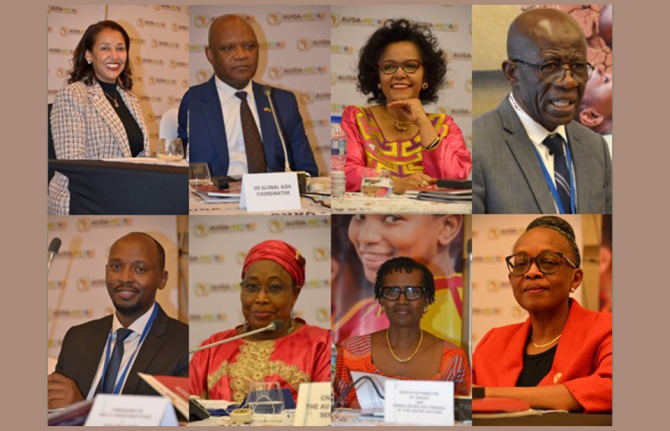
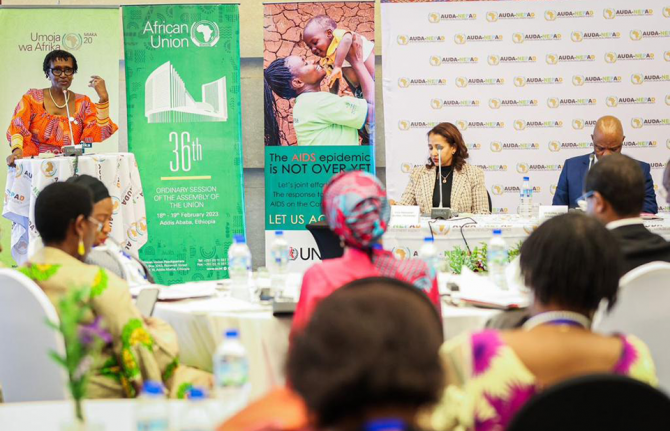
Press Release
African leaders pledge new commitments to end AIDS
20 February 2023 20 February 2023ADDIS ABABA, 20 February 2023—African leaders and partners have joined together at a high-level event on the side-lines of the 36th Session of the African Union to commit to a set of actions to boost progress towards ending AIDS. The event, Health Financing and Sustaining Action to End AIDS and Related Communicable and Non-Communicable Diseases, was co-hosted by the African Union, NEPAD, UNAIDS and PEPFAR.
During the event, heads of state and government adopted a declaration which includes commitments to take personal responsibility and provide active leadership in the AIDS response, champion science and mobilize domestic political and financial support.
African Union Development Agency – (AUDA-NEPAD) Chief Executive Officer Nardos Bekele-Thomas gave the opening remarks, stating that this was the right time to reflect on previous commitments, implementations, and what has worked and what has not. “The COVID-19 pandemic presented essential lessons that we should use to shape the future of our health systems, the African Continent spearheaded collective actions to respond better. Furthermore, we saw the private sector coming together to work with the Governments to provide services to the people that needed them.”
The commitments come at a critical time because despite unprecedented progress, AIDS in Africa is far from over. The massive impacts of the twin pandemics of COVID-19 and HIV have exposed huge weaknesses in health systems across Africa and the continent is not on track to achieve an AIDS-free Africa by 2030.
“The coming into force of the African Medicines Agency (AMA) Treaty is an important milestone for the Continent. Aligned and coordinated regulatory systems will open up the continental market for pharmaceuticals and enable our manufacturers to leverage the advantages of the ACFTA. The AUDA-NEPAD will continue taking technical leadership in the operationalisation of the AMA which will bring us a step closer in our fight against AIDS” said Nardos Bekele-Thomas.
Africa has been disproportionately affected by the AIDS pandemic with 67% of people living with HIV living on the African continent. The spread of the disease has affected every dimension of African society.
"This event is timely as it will allow us to take stock of the progress made and challenges remaining and to consider a way to end AIDS by 2030," stated H.E. Amb. Minata Samate Cessouma, Commissioner for Health, Humanitarian Affairs and Social Development, African Union Commission. "A roadmap that will include achieving the 95-95-95 targets, access to medicines and diagnostics, reducing new infections, diversified and sustainable financing, while closing the equity gap. Let me reaffirm that whenever our leaders take bold initiatives and actions, significant progress has always been made. I hope there will be an Extraordinary Summit dedicated to taking concrete steps towards an AIDS-free Africa by 2030," she concluded.
United in efforts to end AIDS, Africa, supported by partners including UNAIDS, PEPFAR and the Global Fund to Fight AIDS, TB and Malaria, has achieved remarkable results. New HIV infections have been reduced by 60% since the peak in 1996 and in some countries by as much as 95%, AIDS-related deaths have been reduced by 72% since the peak in 2004, and in 2021, 88% of people living with HIV in Africa knew their HIV status of whom 89% were accessing antiretroviral treatment.
However, for the first time in more than two decades, global progress against AIDS is faltering. In Africa, six out of seven new HIV infections among adolescents aged 15-19 years were among girls. Women and girls accounted 62% of all new HIV infections in 2021 and only 50% of children living with HIV received the lifesaving treatment they need.
During the event leaders committed to create a conducive structural, legal, regulatory, and policy environment that addresses persistent HIV-related equity gaps, promote gender equality, respect human rights, and eliminate discrimination and stigma against people living with HIV.
U.S. Global AIDS Coordinator and Special Representative for Global Health Diplomacy Ambassador Dr John Nkengasong, who oversees PEPFAR said, “When HIV/AIDS is over, establishing regional manufacturing on the Continent of Africa will be our legacy for fighting infectious disease across the Continent and globally.”
The declaration noted that weak health systems are continuing to hamper progress, including inadequate human resources for health, weak drug and commodity supply chains, insufficient quality control, inadequate integration of HIV services with other health and social services. A failure to build the capacity, fund and include community organizations as critical and valued partners in the response to HIV is also preventing accelerated progress.
Winnie Byanyima, UNAIDS Executive Director sees universal health care as key. “Universal Health Coverage is another opportunity for African self-reliance, creating national insurance schemes where resources are collected and insurance is rolled out for all those who cannot afford it,” she said. “This must include HIV services. People living with HIV are citizens like any other.”
There was also a deep concern that a significant share of HIV-related programmes were primarily managed, implemented, and financed by external donors rather than governments, and that less than 10% of the 55 African Union member states have met their pledge under the Abuja declaration to allocate 15% of the annual budget to the improvement of the health sector. In the new declaration, leaders committed to implement the Abuja 15% target on domestic financing for health, while transitioning away from dependence on partners’ funding.
Leaders noted with appreciation the Outline of the Roadmap to 2030: ‘sustaining the AIDS response, strengthening health systems and ensuring health security’; and its six pillars and requested the Commission, AUDA-NEPAD to develop a fully costed Roadmap to 2030 and to submit to the Assembly at its next session.
It also invited the Assembly, 10 years after the Abuja+12 to hold a Special Session on Ending AIDS, preventable Maternal deaths and Health Systems strengthening by 2030 no later than July 2024; and called on partners, especially PEPFAR, UNAIDS, The Global Fund, The African Private Sector and others, to support the implementation of this Declaration and Roadmap to 2030.
UNAIDS
The Joint United Nations Programme on HIV/AIDS (UNAIDS) leads and inspires the world to achieve its shared vision of zero new HIV infections, zero discrimination and zero AIDS-related deaths. UNAIDS unites the efforts of 11 UN organizations—UNHCR, UNICEF, WFP, UNDP, UNFPA, UNODC, UN Women, ILO, UNESCO, WHO and the World Bank—and works closely with global and national partners towards ending the AIDS epidemic by 2030 as part of the Sustainable Development Goals. Learn more at unaids.org and connect with us on Facebook, Twitter, Instagram and YouTube.
Contact
AUDA -NEPADBuhle Hlatshwayo
buhleh@nepad.org
African Union
Whitney Mwangi
WhitneyM@africa-union.org
UNAIDS
Charlotte Sector
sectorc@unaids.org
PEPFAR
Veronica Davison
davisonv@state.gov

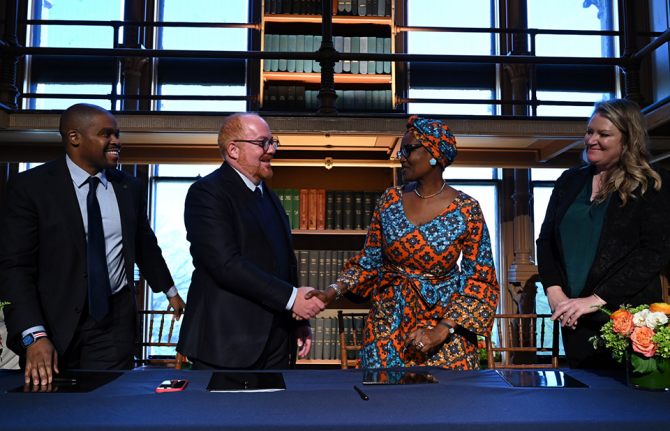
Press Release
New UNAIDS Collaborating Center at Georgetown leverages strengths in HIV/AIDS law, policy and politics
12 April 2023 12 April 2023WASHINGTON DC, 12 April 2023 — The Joint United Nations Programme on HIV/AIDS (UNAIDS) today designated the Global Health Policy and Politics Initiative at Georgetown as a United Nations Collaborating Center to support and advance policy and laws impacting HIV/AIDS with the overarching goal of addressing the inequalities driving the pandemic.
Bridging the Georgetown School of Health and the O’Neill Institute for National & Global Health Law, the Global Health Policy and Politics Initiative leverages scholarship and technical strengths of policy and law experts embedded across Georgetown University. Matthew Kavanagh, PhD, director of the Global Health Policy and Politics Initiative at the O’Neill Institute, and assistant professor of global health in the School of Health, will spearhead the Collaborating Center.
“Legal and political forces continue to shape not only AIDS but all of the pandemics of our time. With Prof. Kavanagh’s leadership, this new Collaborating Center relationship will help build on the work he did at UNAIDS over the last year and a half and deepen our joint efforts to build the law and policy environment needed to end AIDS,” said UNAIDS Executive Director Winnie Byanyima, during a visit to Georgetown on April 12.
From September 2021 to January 2023, Kavanagh served as UNAIDS’ Interim Deputy Executive Director and special advisor to Byanyima in creating a new policy, advocacy, and knowledge branch at UNAIDS. Kavanagh stood up the structures to achieve the ambitious new Global AIDS Strategy focused on closing the inequalities underlying the continuing AIDS pandemic.
“As a Collaborating Center we look forward to working alongside United Nations colleagues from across the Joint Programme to explore more deeply the political determinants of health and help inform the development of laws and policies that can help end the HIV/AIDS pandemic and build resilience for future pandemics,” said Kavanagh. “Alongside my global health colleagues at the O’Neill Institute, School of Health, and through Georgetown’s Global Health Institute, we will be able to amplify our collective work to further advance the effective use of law and policy in response to global public health challenges, including HIV.”
Work of the Global Health Policy & Politics Initiative includes the HIV Policy Lab, a collaborative effort between Georgetown University, UNAIDS, and the Global Network of People Living with HIV, to document, track, and ultimately improve HIV-related policy environments around the world as well as work on community-led monitoring and social science research on the political determinants of health. It was founded at the O’Neill Institute, one of the world’s premier health law and policy institutes that believes that the law is a fundamental tool for solving critical health problems around the world.
“We are thrilled to partner with UNAIDS to launch this innovative Collaborating Center,” said Lawrence O. Gostin, JD, faculty director of the O’Neill Institute, which is also a designated WHO Collaborating Center. “For the past 15 years, the O’Neill Institute’s mission has been to fight for health and justice by advancing laws and policies to tackle critical health challenges worldwide. AIDS changed the world and showed the power of social mobilization. Under the extraordinary leadership of Matt Kavanagh and working with the School of Health, the Center will make a major impact on global public health and justice. I'm proud we are working in deep partnership with UNAIDS.”
“This collaboration reflects our commitment to health equity and presents new interdisciplinary opportunities for students and faculty to advance knowledge and inform policy at the nexus of inequality, law, policy, and HIV,” said Christopher J. King, PhD, dean of the School of Health, a home for scholars and students to work collaboratively across disciplines to address human health and wellbeing from various perspectives. “We are also fortunate to work alongside dedicated faculty members in Georgetown’s Global Health Institute who bring to bear significant scholarship and technical strengths in many aspects of work to eliminate HIV/AIDS.”
The agreement establishing the Collaborating Center, signed earlier today, provides a framework for inter-institutional dialogue and cooperation. In the coming months, the institutions will work to stand up a set of inequality-focused activities, develop formal, regular bilateral consultative meetings, and collaborate on sharing data and political analysis in the years ahead.
UNAIDS
The Joint United Nations Programme on HIV/AIDS (UNAIDS) leads and inspires the world to achieve its shared vision of zero new HIV infections, zero discrimination and zero AIDS-related deaths. UNAIDS unites the efforts of 11 UN organizations—UNHCR, UNICEF, WFP, UNDP, UNFPA, UNODC, UN Women, ILO, UNESCO, WHO and the World Bank—and works closely with global and national partners towards ending the AIDS epidemic by 2030 as part of the Sustainable Development Goals. Learn more at unaids.org and connect with us on Facebook, Twitter, Instagram and YouTube.
Contact
Karen Teber, Georgetown
km463@georgetown.edu
Sophie Barton-Knotts, UNAIDS
bartonknotts@unaids.org

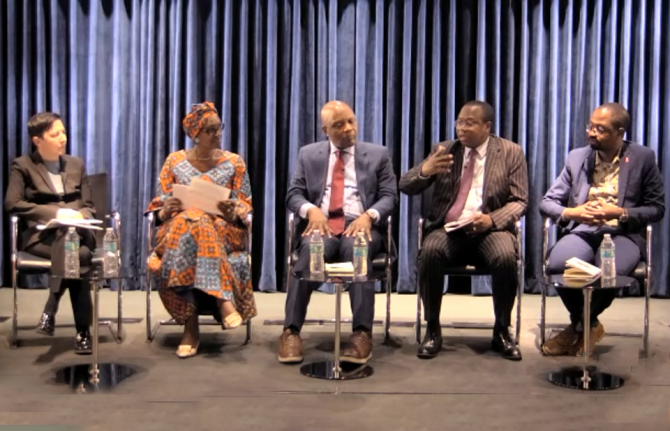
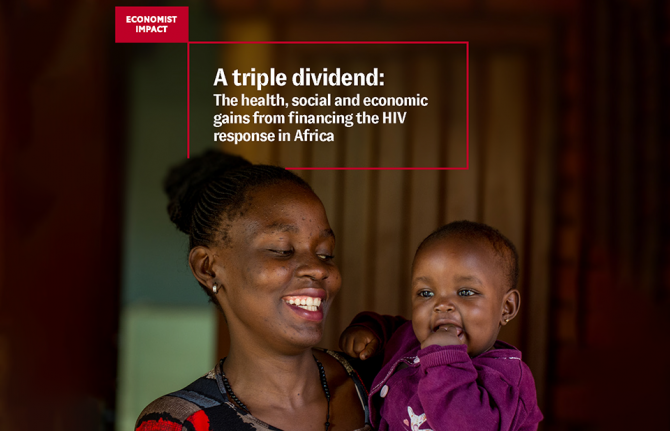
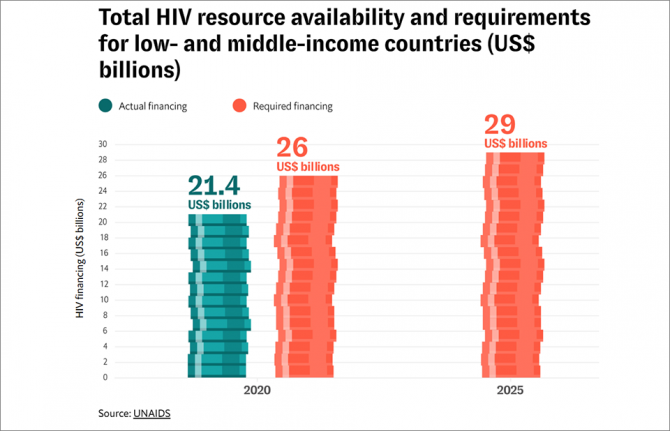
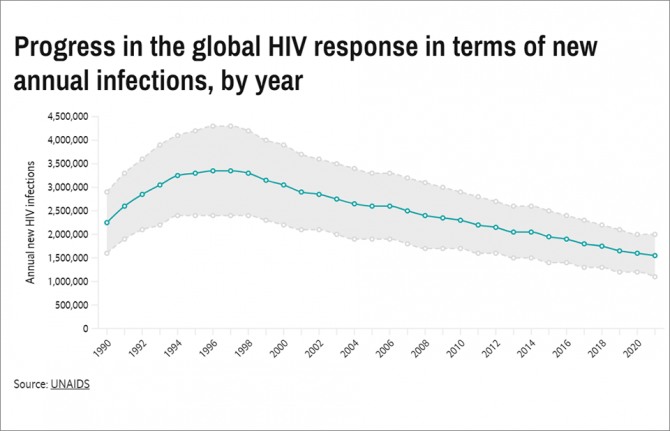
Press Release
A Triple Dividend: Fully financing the HIV response in Africa
12 April 2023 12 April 2023Fully financing the HIV response to get back on track to achieve the 2030 goals will produce substantial health, social and economic gains in African countries. These findings are highlighted in a new report, A Triple Dividend: The health, social and economic gains from financing the HIV response in Africa
WASHINGTON DC/GENEVA, 12 April 2023—Research and analysis by Economist Impact, conducted across 13 African countries, demonstrates that fully financing the HIV response will saves millions of lives and would produce substantial health, social and economic gains.
Not only would there be between 40% and 90% fewer new HIV infections, depending on the country, but investing in the HIV epidemic would also enhance educational outcomes, especially for young women and girls, reduce gender inequalities and boost economic growth.
“This report comes at a critical time with evidence that should act as a catalyst for political decisions to ensure full HIV funding, that will have substantial social and economic outcomes,” said Winnie Byanyima, Executive Director of UNAIDS. “It will put African countries on a path towards building more resilient healthcare systems and be better prepared for future pandemics.”
If the targets for fully financing the HIV response are met in South Africa for example, women aged 15-19 would account for almost 15% of the reduction in new HIV infections by 2030, despite making up less than 5% of the total population. In addition, increased HIV investments today would contribute to wider and sustained economic gains by 2030, and ultimately free up scarce resources going forward to address other critical health priorities. The report projects that South Africa’s GDP could be 2.8% higher and Kenya could see its GDP rise by 1.1% by 2030 if HIV funding targets are met.
“The United States Government was proud to join other United Nations Member states to adopt bold new commitments for AIDS financing by 2025” said Ambassador Dr John N. Nkengasong, U.S. Global AIDS Coordinator and Special Representative for Global Health Diplomacy. “Ending AIDS as a public health threat requires political, programmatic and financial leadership. All government sectors, including the Ministries of Finance, play a key role in increasing domestic financing to ensure that vulnerable populations are reached equitably and receive the prevention, care and treatment services they need.”
The report, A Triple Dividend: The health, social and economic gains from financing the HIV response in Africa, demonstrates that failing to mobilise the required funding to end AIDS as a public health threat by 2030 has substantial health, social and economic costs.
To assess these costs, Economist Impact, supported by UNAIDS, analysed scenarios in which 100% of financial resources required to meet the 2021 Political Declaration on HIV and AIDS targets were compared to a business-as-usual funding scenario where HIV current financing and service levels are maintained. It showed that the resulting improvements in health outcomes would also increase educational gains, which combined, generate increased productivity of both current and future generations, contributing to wider economic benefits.
“Countries in Africa are up against significant challenges to secure the necessary resources to increase domestic funding for the HIV response,” said Rob Cook, clinical programme director at Economist Impact. “Policymakers will need to think innovatively about how they can use existing financing more effectively. Drawing on existing community-centred networks could play a key role in both mobilising additional resources for the HIV response and ensuring that it is equitable and reaches those most in need.”
Recent global crises, including COVID-19 and the war in Ukraine, have hampered efforts to address the HIV epidemic and placed strong pressure on financing for health and other Sustainable Development Goals. Young women, children and other vulnerable populations will pay the highest price as pre-existing health and socio-economic inequalities widen. The significant fiscal challenges facing African countries has limited their ability to increase domestic financing of the HIV response and constrained overall health budgets. Economist Impact’s research points towards the need for policies that aim to both generate new revenue streams and maximise the use of existing funds and resources.
UNAIDS estimates that low and middle-income countries will need investments of US$ 29 billion annually to meet targets of ending AIDS as a public health threat by 2030. Funding levels in 2020 fell almost 30% below targets, making subsequent resource needs harder to achieve and putting upcoming targets further out of reach. UNAIDS projects more than 7 million AIDS-related deaths by 2030, but half of those can be averted if the HIV response is fully financed and policies are rightly oriented.
Global 2025 targets include reducing new HIV infections to under 370 000 (from 1.5 million in 2021), reducing HIV infections among adolescent girls and young women to less than 50 000 and reducing the number of people dying from AIDS-related illnesses to less than 250 000 (compared to 650 000 in 2021).
LAUNCH DETAILS
The Triple Dividend event and report will be launched at an event co-hosted by UNAIDS and PEPFAR to be held at the Kaiser Family Foundation on Wednesday 12 April in Washington DC at 3pm EDT / 9pm CET / 7pm GMT and will feature:
- Winnie Byanyima, Executive Director, UNAIDS
- Ambassador John Nkengasong, U.S. Global AIDS Coordinator and Special Representative for Global Health Diplomacy, PEPFAR
- Minister Mthuli Ncube, Minister of Finance of Zimbabwe
- Allan Maleche, Executive Director of Kenya Legal and Ethical Issues Network on HIV and AIDS (KELIN)
- David Humphries, Global Head of Health Policy, Economist Impact
The event will be moderated by:
- Jennifer Kates, Senior Vice President and Director of Global Health & HIV Policy, KFF
UNAIDS
The Joint United Nations Programme on HIV/AIDS (UNAIDS) leads and inspires the world to achieve its shared vision of zero new HIV infections, zero discrimination and zero AIDS-related deaths. UNAIDS unites the efforts of 11 UN organizations—UNHCR, UNICEF, WFP, UNDP, UNFPA, UNODC, UN Women, ILO, UNESCO, WHO and the World Bank—and works closely with global and national partners towards ending the AIDS epidemic by 2030 as part of the Sustainable Development Goals. Learn more at unaids.org and connect with us on Facebook, Twitter, Instagram and YouTube.
Watch the launch

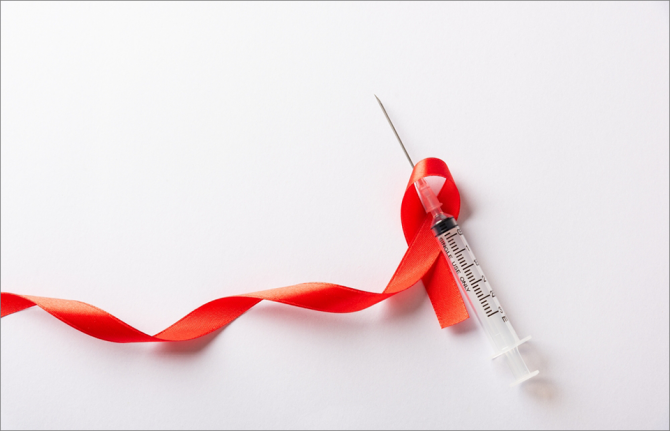
Press Release
UNAIDS welcomes the announcement by Medicines Patent Pool (MPP) and ViiV of three licenses signed with generic manufacturers for long-acting PrEP, and urges further urgent action by ViiV
31 March 2023 31 March 2023GENEVA, 31 March 2023 — UNAIDS welcomes the announcement by Medicines Patent Pool (MPP) and ViiV of three licenses signed with generic manufacturers Aurobindo, Cipla and Viatris for long-acting Cabotegravir for PrEP (Pre-exposure prophylaxis.) PrEP reduces risk of HIV transmission from sex or injecting drug use. UNAIDS also called for urgent action by ViiV to be taken to reduce the price and increase the production of CAB-LA now.
UNAIDS Deputy Executive Director for Policy, Advocacy and Knowledge, Christine Stegling said:
“UNAIDS applauds this announcement by the Medicines Patent Pool, and congratulates the companies on securing the licensing agreement. The generic production of affordable CAB-LA is essential to preventing millions of new HIV infections. The progress made is a testament to the power of campaigning communities who have mobilised to demand long-acting medicines, and to the determined efforts of access to medicines advocates. UNAIDS thanks ViiV for the commitment to tech sharing made through these agreements, and urges all patent holders of long-acting HIV medicines, including those still in development, to commit to share, and make their technology available, now. UNAIDS welcomes that this is only the first announcement of licensing, not the last, and urges ViiV to expand the geographic coverage of the licensing to all low and middle income countries. Because generic production will take several years to get to medicines being available for use, UNAIDS also urges ViiV to right now provide its own production of CAB-LA to procurers at an affordable price and in volumes that match need. We must all be driven by the fierce urgency of now.”
Progress in the global HIV response is slowing, and too many countries are seeing rising infections. The 2025 targets are in danger, and only bold actions can enable the curve of new infections to be pulled down. The deployment of new technologies such as long-acting CAB-LA at an affordable price is urgent and will help fill critical HIV prevention needs for people facing the highest HIV risks. It is also notably welcome that one of the sub-licenses (Cipla) plans to manufacture in South Africa, in addition to India. This is an important step in support of increased local manufacturing of medicines in Africa.
UNAIDS acknowledges this concrete step towards generic production of needed innovative products but urges that short term solutions be put in place immediately and until generic products are widely available. UNAIDS is notably concerned with the recent announcements that current supplies of CAB-LA are not at all sufficient to meet growing demand, and are much less than procurers have said they could purchase. Transparency in sharing information on volumes and price by ViiV of long-acting CAB-LA is essential to help drive progress in increasing volumes.
It is vital and urgent that long-acting anti-retrovirals for PrEP be made available at an affordable price everywhere they are needed. Middle-income countries are now where the majority of new HIV infections occur and home to many of the key populations most at risk of HIV transmission and who most need access to long-acting ARVs. But many countries are not included in this license despite considerable need for affordable new health technologies.
The issuance of these three licenses should pave the way for sharing technology on other innovations for long-acting HIV prevention and for long-acting treatment. UNAIDS urges that licensing help develop a path for accelerated market entry of generic formulations of long-acting anti-retrovirals not only for prevention, but also for treatment, when normative guidance is established, and regulatory approvals are in place at country level.
UNAIDS calls on the private sector, governments and funders to ensure that everyone who needs long-acting antiretrovirals can access them. UNAIDS will continue working with the Coalition to Accelerate Access to Long-Acting PrEP that is jointly convened by the Global Fund on AIDS, TB and Malaria, PEPFAR, Unitaid and the World Health Organization (WHO) with AVAC as its Secretariat to find solutions and ensure equitable global access to pandemic-fighting technologies for all.
UNAIDS
The Joint United Nations Programme on HIV/AIDS (UNAIDS) leads and inspires the world to achieve its shared vision of zero new HIV infections, zero discrimination and zero AIDS-related deaths. UNAIDS unites the efforts of 11 UN organizations—UNHCR, UNICEF, WFP, UNDP, UNFPA, UNODC, UN Women, ILO, UNESCO, WHO and the World Bank—and works closely with global and national partners towards ending the AIDS epidemic by 2030 as part of the Sustainable Development Goals. Learn more at unaids.org and connect with us on Facebook, Twitter, Instagram and YouTube.

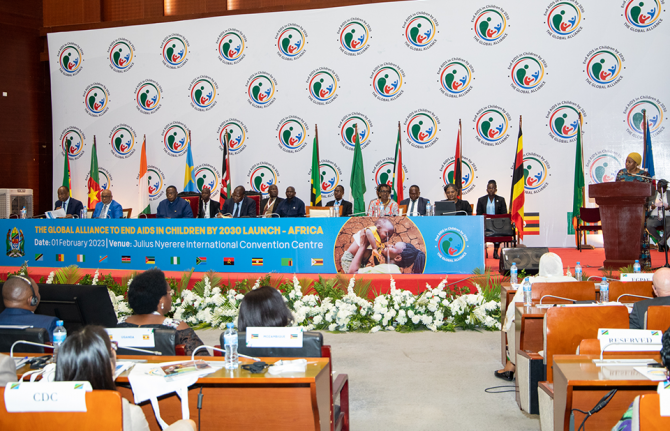
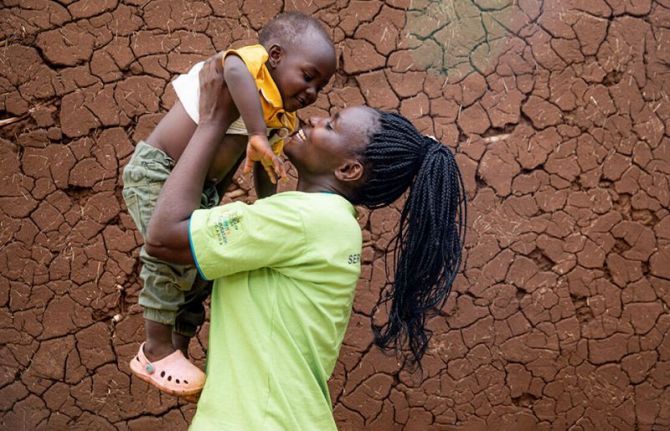
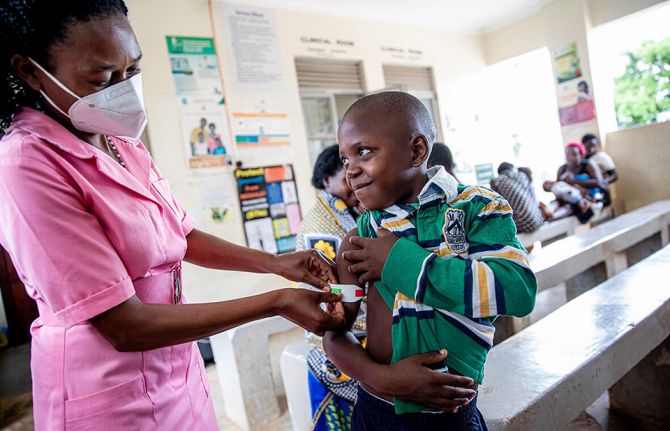
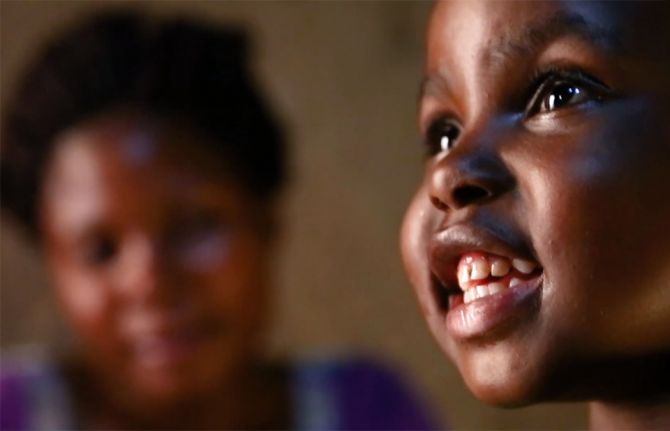
Press Release
African leaders unite in pledge to end AIDS in children
01 February 2023 01 February 2023DAR ES SALAAM, 1 February 2023—Ministers and representatives from twelve African countries have committed themselves, and laid out their plans, to end AIDS in children by 2030. International partners have set out how they would support countries in delivering on those plans, which were issued at the first ministerial meeting of the Global Alliance to end AIDS in children.
The meeting hosted by the United Republic of Tanzania, marks a step up in action to ensure that all children with HIV have access to life saving treatment and that mothers living with HIV have babies free from HIV. The Alliance will work to drive progress over the next seven years, to ensure that the 2030 target is met.
Currently, around the world, a child dies from AIDS related causes every five minutes.
Only half (52%) of children living with HIV are on life-saving treatment, far behind adults of whom three quarters (76%) are receiving antiretrovirals.
In 2021,160 000 children newly acquired HIV. Children accounted for 15% of all AIDS-related deaths, despite the fact that only 4% of the total number of people living with HIV are children.
In partnership with networks of people living with HIV and community leaders, ministers laid out their action plans to help find and provide testing to more pregnant women and link them to care. The plans also involve finding and caring for infants and children living with HIV.
The Dar-es-Salaam Declaration on ending AIDS in children was endorsed unanimously.
Vice-President of the United Republic of Tanzania, Philip Mpango said, “Tanzania has showed its political engagement, now we need to commit moving forward as a collective whole. All of us in our capacities must have a role to play to end AIDS in children. The Global Alliance is the right direction, and we must not remain complacent. 2030 is at our doorstep.”
The First Lady of Namibia Monica Geingos agreed. “This gathering of leaders is uniting in a solemn vow – and a clear plan of action – to end AIDS in children once and for all,” she said. “There is no higher priority than this.”
Twelve countries with high HIV burdens have joined the alliance in the first phase: Angola, Cameroon, Côte d'Ivoire, the Democratic Republic of the Congo (DRC), Kenya, Mozambique, Nigeria, South Africa, the United Republic of Tanzania, Uganda, Zambia, and Zimbabwe.
The work will centre on four pillars across:
- Early testing and optimal treatment and care for infants, children, and adolescents;
- Closing the treatment gap for pregnant and breastfeeding women living with HIV, to eliminate vertical transmission;
- Preventing new HIV infections among pregnant and breastfeeding adolescent girls and women; and
- Addressing rights, gender equality and the social and structural barriers that hinder access to services.
UNICEF welcomed the leaders’ commitments and pledged their support. "Every child has the right to a healthy and hopeful future, but for more than half of children living with HIV, that future is threatened," said UNICEF Associate Director Anurita Bains. "We cannot let children continue to be left behind in the global response to HIV and AIDS. Governments and partners can count on UNICEF to be there every step of the way. This includes work to integrate HIV services into primary health care and strengthen the capacity of local health systems."
“This meeting has given me hope,” said Winnie Byanyima, Executive Director of UNAIDS. “An inequality that breaks my heart is that against children living with HIV, and leaders today have set out their commitment to the determined action needed to put it right. As the leaders noted, with the science that we have today, no baby needs to be born with HIV or get infected during breastfeeding, and no child living with HIV needs to be without treatment. The leaders were clear: they will close the treatment gap for children to save children’s lives.”
WHO set out its commitment to health for all, leaving no children in need of HIV treatment behind. “More than 40 years since AIDS first emerged, we have come a long way in preventing infections among children and increasing access to treatment, but progress has stalled,” said Dr Tedros Adhanom Ghebreyesus, WHO Director-General. “The Global Alliance to End AIDS in Children is a much-needed initiative to reinvigorate progress. WHO is committed to supporting countries with the technical leadership and policy implementation to realise our shared vision of ending AIDS in children by 2030.”
Peter Sands, Executive Director of The Global Fund, said, “In 2023, no child should be born with HIV, and no child should die from an AIDS-related illness. Let’s seize this opportunity to work in partnership to make sure the action plans endorsed today are translated into concrete steps and implemented at scale. Together, led by communities most affected by HIV, we know we can achieve remarkable results.”
PEPFAR's John Nkengasong, U.S. Global AIDS Coordinator, said he remains confident. "Closing the gap for children will require laser focus and a steadfast commitment to hold ourselves, governments, and all partners accountable for results. In partnership with the Global Alliance, PEPFAR commits to elevate the HIV/AIDS children's agenda to the highest political level within and across countries to mobilize the necessary support needed to address rights, gender equality and the social and structural barriers that hinder access to prevention and treatment services for children and their families."
EGPAF President and CEO, Chip Lyons, said that the plans shared, if implemented, would mean children were no longer left behind. “Often, services for children are set aside when budgets are tight or other challenges stand in the way. Today, African leaders endorsed detailed plans to end AIDS in children – now is the time for us all to commit to speaking up for children so that they are both prioritized and included in the HIV response.”
Delegates emphasized the importance of a grounds-up approach with local, national and regional stakeholders taking ownership of the initiative, and engagement of a broad set of partners. The alliance has engaged support from Africa REACH and other diverse partners and welcomes all countries to join.
“We have helped shape the Global Alliance and have ensured that human rights, community engagement and gender equality are pillars of the Alliance,” said Lilian Mworeko, Executive Director of the International Community of Women living with HIV in Eastern Africa on behalf of ICW, Y+ Global and GNP+. “We believe a women-led response is key to ending AIDS in children.”
Progress is possible. Sixteen countries and territories have already been certified for validation of eliminating vertical transmission of HIV and/or syphilis; while HIV and other infections can pass from a mother to child during pregnancy or while breastfeeding, such transmission can be interrupted with prompt HIV treatment for pregnant women living with HIV or pre-exposure prophylaxis (PrEP) for mothers at risk of HIV infection.
Last year Botswana was the first African country with high HIV prevalence to be validated as being on the path to eliminating vertical transmission of HIV, which means the country had fewer than 500 new HIV infections among babies per 100 000 births. The vertical transmission rate in the country was 2% versus 10% a decade ago.
UNAIDS, networks of people living with HIV, UNICEF and WHO together with technical partners, PEPFAR and The Global Fund unveiled the Global Alliance to end AIDS in children in July 2022 at the AIDS conference in Montreal, Canada. Now, at its first ministerial meeting, African leaders have set out how the Alliance will deliver on the promise to end AIDS in children by 2030.
UNAIDS
The Joint United Nations Programme on HIV/AIDS (UNAIDS) leads and inspires the world to achieve its shared vision of zero new HIV infections, zero discrimination and zero AIDS-related deaths. UNAIDS unites the efforts of 11 UN organizations—UNHCR, UNICEF, WFP, UNDP, UNFPA, UNODC, UN Women, ILO, UNESCO, WHO and the World Bank—and works closely with global and national partners towards ending the AIDS epidemic by 2030 as part of the Sustainable Development Goals. Learn more at unaids.org and connect with us on Facebook, Twitter, Instagram and YouTube.
Contact
UNAIDSCharlotte Sector
sectorc@unaids.org
The Global Fund
Ann Vaessen
ann.vaessen@theglobalfund.org
UNICEF
Sara Alhattab
salhattab@unicef.org
WHO
Sonali Reddy
reddys@who.int
